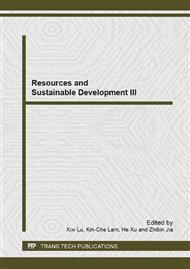p.741
p.746
p.751
p.757
p.762
p.771
p.775
p.780
p.784
Production Modes Switch Optimization of Refinery Units
Abstract:
Refinery units have the feature of operating inertia, long time transition period exists when production modes switch, during which product quality may decline and energy cost raises. The operating inertia have received significant attentions in actual refineries, while few literatures have given enough focus on it which is usually omitted to make scheduling easy. The core of this paper is to deal with the scheduling optimization problem of production modes switch considering operating inertia. By expression of the transition process, a mixed integer linear programming model was built based on a continuous time representation. The model optimizes unit operations by minimizing energy consuming. The formulation approach was used to address the scheduling of a refinery. Case study illustrates the model’s feasibility and efficiency.
Info:
Periodical:
Pages:
762-767
Citation:
Online since:
June 2014
Authors:
Price:
Сopyright:
© 2014 Trans Tech Publications Ltd. All Rights Reserved
Share:
Citation:


